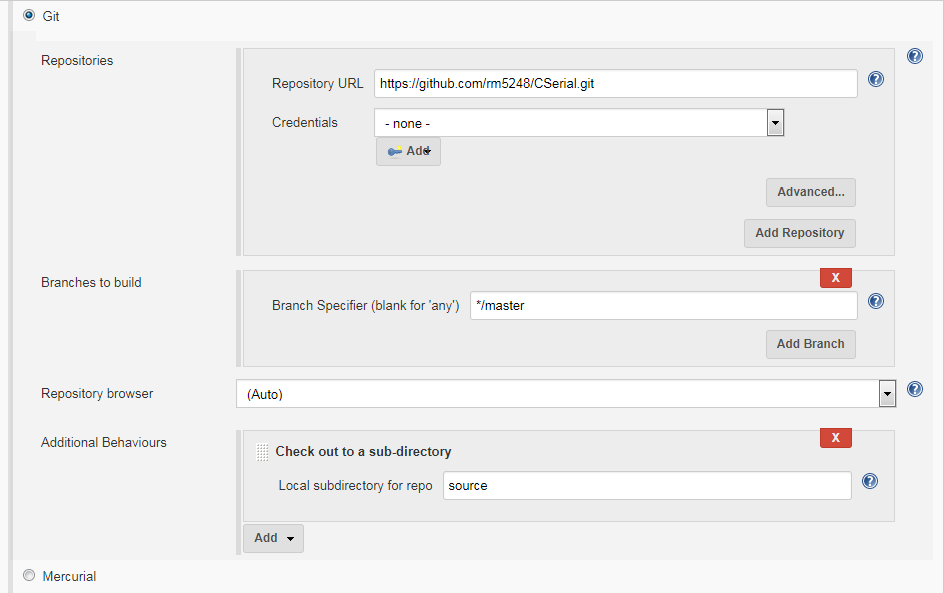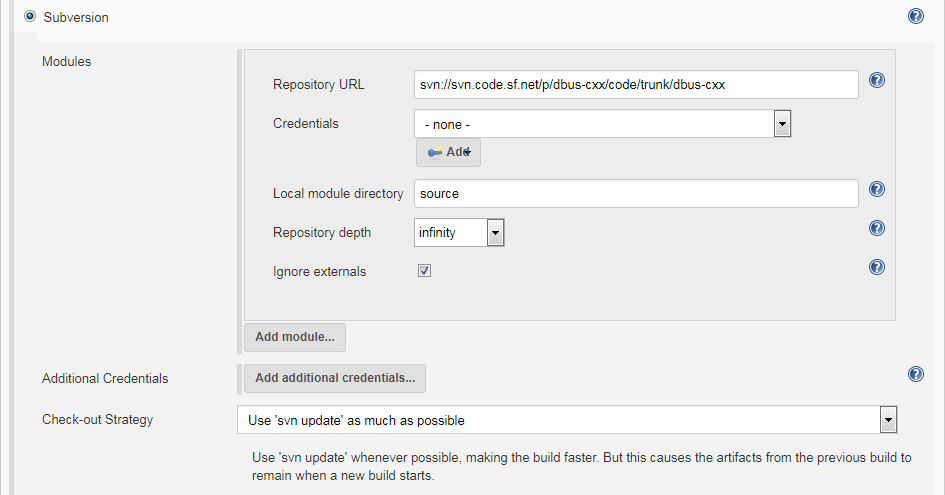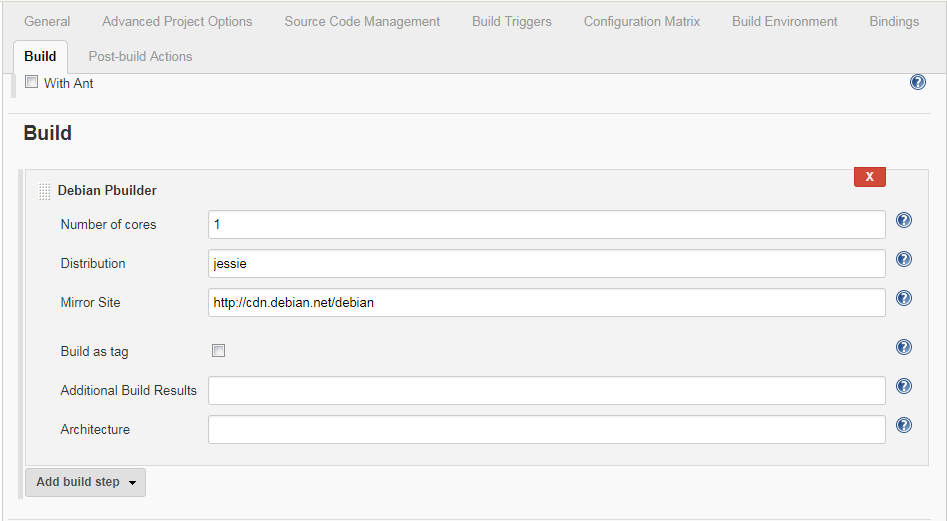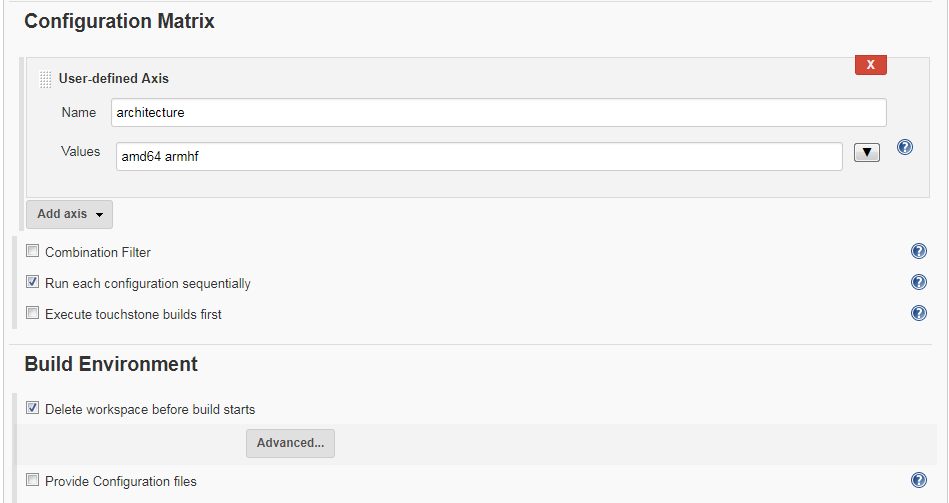This plugin allows you to build deb packages in a pbuilder environment.
This plugin is based largely off of jenkins-debian-glue.
Find pre-built versions of this plugin on this Jenkins instance!
Before you can successfully run the plugin, there are certain requirements that must be met on the node(s) that you wish to run on.
-
Install needed dependencies:
apt-get install qemu-user-static devscripts cowbuilder dpkg-dev -
If building Debian packages on Ubuntu, make sure that the package debian-archive-keyring is installed
-
Like jenkins-debian-glue, make sure that sudo is configured properly. As taken from the jenkins-debian-glue webpage, add the following to either /etc/sudoers, or create a new file(e.g. /etc/sudoers.d/jenkins):
jenkins ALL=NOPASSWD: /usr/sbin/cowbuilder, /usr/sbin/chroot, /usr/sbin/pbuilder Defaults env_keep+="DEB_* DIST ARCH"(this assumes that Jenkins is running under the jenkins user)
There are several global configuration options. These options may be found by going to "Manage Jenkins" → "Configure System".
- Email address - this is the email that is set in the changelog entry for the build. It need not be an actual email address
- Version format - Determines how the package will be versioned if not a tag build
- Debian directory - determines where the debian/ folder is, by default the project should be checked out to a directory called 'source'
This plugin may be configured as both a traditional Jenkins build, or as a Pipeline project.
-
Create a new project. If you want to build for multiple architectures, select "Multi-configuration project"
-
Checkout source code. When you checkout the source code for the project, it should be in a subdirectory called 'source'(this value can be changed on either a per-build configuration or globally). This can be done as either an SVN repository, or a git repository. To checkout to the proper directory using git, go to "Additional Behaviors" and select "Check out to a sub-directory", and put "source" as the value. To checkout to the proper directory using SVN, under "Local module directory" put "source" as the value.


-
Under 'Build Environment', select 'Delete workspace before build starts'
-
If you have a matrix configuration project, add a new variable called "architecture". Put in the proper architectures to build for in this section; this must map to a valid architecture that exists in the distribution repos.
-
Under the 'Build' section, add 'Debian Pbuilder'. Most of these settings may be left at their default values, however it is highly recommended to fill in the "Distribution" and "Mirror Site" variables in order to ensure that you get a consistent build. Otherwise, pbuilder will use the defaults for whatever distribution you are currently running.

-
If you have custom pbuilder hook files that you want to install, install the Config File Provider to add in config files. Set the 'target' option to be `hookdir/<file-name>`.
If using pipeline, you may setup a job similar to the following:
Pipeline Setup - single arch
node {
ws {
stage( "clean" ){
cleanWs()
}
stage( "checkout" ){
checkout([$class: 'GitSCM', branches:
[[name: '*/jenkinsfile-updates']],
doGenerateSubmoduleConfigurations: false,
extensions: [[$class: 'RelativeTargetDirectory', relativeTargetDir: 'source']],
submoduleCfg: [],
userRemoteConfigs: [[credentialsId: '78de5c66-5dfb-4c95-8ad9-ec34e8dee4ec', url: 'git@github.com:rm5248/CSerial.git']]])
}
stage("build"){
//Actually build the package.
//Note that you can go to the 'Pipeline Syntax' page on your Jenkins instance to generate this automatically
debianPbuilder additionalBuildResults: '', architecture: '', distribution: 'jessie', keyring: '', mirrorSite: 'http://ftp.us.debian.org'
}
}
}
The following example shows how to build for multiple architectures:
Pipeline Setup - Multiple arch
def axisArchitecture = ["amd64", "armhf"]
def axisNode = ["master"]
def tasks = [:]
for( int i = 0; i < axisArchitecture.size(); i++ ){
def arch = axisArchitecture[i];
tasks["${axisNode[0]}/${axisArchitecture[i]}"] = {
node(axisNode[0]){
ws{
stage( "clean" ){
cleanWs()
}
stage( "checkout" ){
checkout([$class: 'GitSCM', branches:
[[name: '*/jenkinsfile-updates']],
doGenerateSubmoduleConfigurations: false,
extensions: [[$class: 'RelativeTargetDirectory', relativeTargetDir: 'source']],
submoduleCfg: [],
userRemoteConfigs: [[credentialsId: '78de5c66-5dfb-4c95-8ad9-ec34e8dee4ec', url: 'git@github.com:rm5248/CSerial.git']]])
}
stage("build-${arch}"){
debianPbuilder architecture:"${arch}"
}
}
}
}
}
stage('build'){
parallel tasks
}
** Pipeline setup - declarative **
pipeline{
agent any
stages{
stage("clean"){
steps{
cleanWs()
}
}
stage("checkout"){
steps{
dir('source'){
git 'https://github.com/rm5248/CSerial.git'
}
}
}
stage('build'){
steps{
debianPbuilder additionalBuildResults: '',
architecture: 'armhf',
artifactoryRepoName: '',
components: '',
distribution: 'buster',
extraPackages: '',
keyring: '',
mirrorSite: 'https://deb.debian.org/debian',
otherMirror: '',
pbuilderType: 'PBuilder', pristineTarName: ''
}
}
}
}
When building a Debian package, all of the dependencies must be installed into the rootfs before the package can be built. If these packages are not in the official repos, we must somehow get them into the rootfs.
There are several ways to do this:
- Setup your own repository and add your repository into the rootfs. In order to do this, you need to make a 'D' hook script(something like D20-repos) and have it add in your repostory:
echo "deb http://my-repository.example.com main" > /etc/apt/sources.list.d/my-repo.list
apt-get update
- Build your dependencies as part of your Jenkinsfile, or in a separate job. In order to help facilitate this, you can set the BINDMOUNTS that pbulider uses, in addition to setting the output directory to be stable.
Here is an example using dbus-cxx. First, we need to build the libsigc++-3.0 dependency:
pipeline{
agent any
stages{
stage("clean"){
steps{
cleanWs()
}
}
stage("checkout"){
steps{
dir('source'){
git 'https://github.com/dbus-cxx/libsigc--3.0.git'
}
}
}
stage('build'){
steps{
debianPbuilder additionalBuildResults: '',
architecture: '',
artifactoryRepoName: '',
components: '',
distribution: 'bullseye',
extraPackages: '',
keyring: '',
mirrorSite: 'https://deb.debian.org/debian',
otherMirror: '',
pbuilderType: 'PBuilder', pristineTarName: 'libsigc++-3.0_3.0.3.orig.tar.xz'
}
}
}
}
Next, we will build dbus-cxx utilizing the Copy Artifacts plugin in order to grab the pre-built dependencies. In the chroot before we build we will also tell apt to create the needed files and update its database. Note that we also need to set the 'bindMounts' parameter in order to ensure that the folder containing the deb files will be available inside of the chroot.
pipeline{
agent any
stages{
stage("clean"){
steps{
cleanWs()
}
}
stage("checkout"){
steps{
dir('source'){
git 'https://github.com/dbus-cxx/dbus-cxx.git'
}
}
}
stage('build'){
steps{
// Grab our dependencies from libsigc++
copyArtifacts fingerprintArtifacts: true, projectName: 'libsigc++', selector: lastSuccessful(), target: 'binaries'
// Make a hook that will build up the meta-data for apt
dir('hookdir'){
sh '''#/bin/bash
cat <<EOF > D05-local-repo
(cd /binaries; apt-ftparchive packages . > Packages; apt-ftparchive release . > Release)
echo \"deb [trusted=yes] file:///binaries ./\" > /etc/apt/sources.list.d/local-repo.list
apt-get update
EOF
'''
}
debianPbuilder additionalBuildResults: '',
architecture: '',
artifactoryRepoName: '',
components: '',
distribution: 'bullseye',
extraPackages: 'apt-utils',
keyring: '',
mirrorSite: 'https://deb.debian.org/debian',
otherMirror: '',
pbuilderType: 'PBuilder',
pristineTarName: '',
bindMounts: 'binaries'
}
}
}
}
See also: https://askubuntu.com/questions/3623/how-can-i-use-local-deb-files-in-my-pbuilder-builds
By default the plugin will increment the current version number by reading 'debian/changelog'. The algorithm follows the standard Debian practice of packages having a ~ being a pre-release version, and packages with a + denoting a version greater than what is default. Note that this only happens if the the distribution set in 'debian/changelog' is UNRELEASED, or a tag is being built. Tags are automatically scanned; if using SVN or git, the environment variables SVN_URL_1 and GIT_BRANCH are scanned for the substring "tags/"; if the substring is found, the package will be built as a tag. Otherwise, you can also select the "Build as tag" to force the package to not increment the version number, or alternatively set the environment variable DEB_PBUILDER_BUILDING_TAG if you are building a tag.
All generated files are automatically added to the build artifacts for easy retrieval. This includes the deb files, as well as the dsc and tar files used to build the package in the pbuilder environment.
All output can be found in the build output of the project when it is built. If for some reason the build fails, this is a good first place to look. If there is a configuration problem, a (hopefully) useful error message will be printed out when the build fails.
When building a package with format "3.0 (quilt)", you must provide the orig.tar.gz file for the builder to work properly. This can be done one of two ways: either you can provide the orig.tar.gz through a pre-build step of some kind, or under the 'advanced' section there is a field for you to fill in the name of the package to checkout using the 'pristine-tar' command.
This plugin allows you to use either Cowbuilder or Pbuilder to build packages. If you are cross-compiling, using PBuilder is probably faster than using Cowbuilder. When cross-compiling, the rootfs will be your native architecture, and a cross-compiler will be used to compile the code. This depends on any dependent packages being multiarch capable.
With multiarch-compatible packages, this means that any dependent packages that get installed into the rootfs must install pkgconfig files into /usr/lib//pkgconfig for example.
Please file any bugs that you may find on the Jenkins JIRA, using the debian-pbuilder-plugin component. Click here for all open issues.
